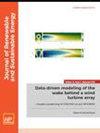研究不同工况下参考条件对光伏组件电性能估计的影响
IF 1.9
4区 工程技术
Q4 ENERGY & FUELS
引用次数: 0
摘要
在传统的方法中,光伏组件的电性能估计是通过两个步骤来实现的。首先,选择一定的条件(通常是标准测试条件,STC)作为参考条件,从电流-电压数据点中提取参考条件下的物理参数。其次,通过变换方程得到不同工况下的物理参数,估算光伏组件的电学性能;本文研究了不同参考条件对性能估计精度的影响。对不同参考条件下的估计结果进行比较,得到误差分布规律,对实际应用中参考条件的选择具有重要的参考意义。此外,还提出了一种选择参考条件的方法。通过考虑不同工况下每条I-V曲线的三个关键工作点,提出了一种新的目标函数,以平衡精度和计算复杂度。利用大量不同类型光伏组件的实验数据验证了所提方法的有效性和准确性。与以STC为参考条件的传统方法和Matlab/Simulink中已有的方法相比,本文方法得到的结果具有更好的精度。可进一步用于估算不同工况下光伏系统的输出功率。本文章由计算机程序翻译,如有差异,请以英文原文为准。
Study of the effects of reference conditions on electrical properties estimation for PV modules under varying operating conditions
In traditional methods, electrical property estimation of photovoltaic (PV) modules is achieved through two steps. First, a certain condition (usually standard testing condition, STC) is selected as the reference condition, and the physical parameters under the reference condition are extracted from current–voltage data points. Second, physical parameters under varying operating conditions are obtained by transforming equations, and the electrical properties of the PV modules are estimated. In this paper, the influence of different reference conditions on the accuracy of performance estimation is studied. The estimation results using different reference conditions are compared to obtain the error distribution pattern, which has essential reference significance for the selection of reference conditions in practical applications. In addition, a method of the selecting reference condition is proposed. A new objective function is proposed by considering three key operating points for each I–V curve under different operating conditions, which balances accuracy and computational complexity. A large amount of experimental data for different types of PV modules are used to validate the effectiveness and accuracy of the proposed method. In comparison with the traditional methods using STC as the reference condition and existing method in Matlab/Simulink, the results obtained by the proposed method exhibit better accuracy. It can be further used to estimate the output power of PV system under varying operating conditions.
求助全文
通过发布文献求助,成功后即可免费获取论文全文。
去求助
来源期刊

Journal of Renewable and Sustainable Energy
ENERGY & FUELS-ENERGY & FUELS
CiteScore
4.30
自引率
12.00%
发文量
122
审稿时长
4.2 months
期刊介绍:
The Journal of Renewable and Sustainable Energy (JRSE) is an interdisciplinary, peer-reviewed journal covering all areas of renewable and sustainable energy relevant to the physical science and engineering communities. The interdisciplinary approach of the publication ensures that the editors draw from researchers worldwide in a diverse range of fields.
Topics covered include:
Renewable energy economics and policy
Renewable energy resource assessment
Solar energy: photovoltaics, solar thermal energy, solar energy for fuels
Wind energy: wind farms, rotors and blades, on- and offshore wind conditions, aerodynamics, fluid dynamics
Bioenergy: biofuels, biomass conversion, artificial photosynthesis
Distributed energy generation: rooftop PV, distributed fuel cells, distributed wind, micro-hydrogen power generation
Power distribution & systems modeling: power electronics and controls, smart grid
Energy efficient buildings: smart windows, PV, wind, power management
Energy conversion: flexoelectric, piezoelectric, thermoelectric, other technologies
Energy storage: batteries, supercapacitors, hydrogen storage, other fuels
Fuel cells: proton exchange membrane cells, solid oxide cells, hybrid fuel cells, other
Marine and hydroelectric energy: dams, tides, waves, other
Transportation: alternative vehicle technologies, plug-in technologies, other
Geothermal energy
 求助内容:
求助内容: 应助结果提醒方式:
应助结果提醒方式:


